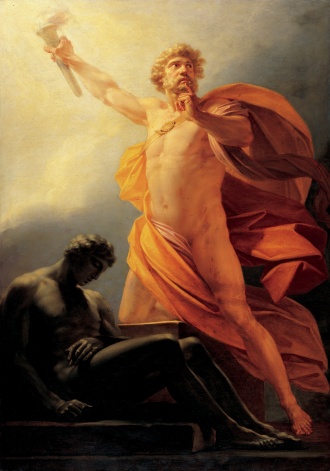Prometheseus and Pandora
Prometheus brings Fire to Mankind - Henry Fuger

Prometheus' story
The Prometheus myth first appeared in the late 8th-century BC Greek epic poet Hesiod's Theogony). He was a son of the Titan, Iapetus by Clymene. In the Theogony, Hesiod introduces Prometheus as a lowly challenger to Zeus' omniscience and omnipotence.
In the trick at Mecone, a sacrificial meal marking the "settling of accounts" between mortals and immortals, Prometheus played a trick against Zeus. He placed two sacrificial offerings before the Olympian: a selection of beef hidden inside an ox's stomach (nourishment hidden inside a displeasing exterior), and the bull's bones wrapped completely in "glistening fat" (something inedible hidden inside a pleasing exterior).
Zeus chose the latter, setting a precedent for future sacrifices; henceforth, humans would keep the meat for themselves and burn the bones wrapped in fat as an offering to the gods.
This angered Zeus, who hid fire from humans in retribution. Prometheus in turn stole fire in a giant fennel-stalk and gave it back to mankind. This further enraged Zeus, who sent Pandora, the first woman, to live with men. She was fashioned by Hephaestus out of clay and brought to life by the four winds, with all the goddesses of Olympus assembled to adorn her. "From her is the race of women and female kind," Hesiod writes; "of her is the deadly race and tribe of women who live amongst mortal men to their great trouble, no helpmeets in hateful poverty, but only in wealth."
Prometheus, in eternal punishment, is chained to a rock in the Caucasus, where his liver is eaten out daily by an eagle, only to be regenerated by night, which, by legend, is due to his immortality. Years later, the Greek hero Heracles slays the eagle and frees Prometheus from his chains.
http://en.wikipedia.org/wiki/Prometheus
Promethesus
Theft of Fire

painting by 17th century artist Jan Cossier
PROMETHEUS AGAINST ZEUS
The Nature of Sacrifice. Their antagonism began when Prometheus dared to match wits with Zeus. There was a quarrel between mortals and the gods, apparently about how the parts of the sacrificial animals should be apportioned. Prometheus divided up a great ox and for his creatures, us mortals, he wrapped the flesh and the rich and fatty innards in the ox’s paunch. For the gods, however, he deviously and artfully wrapped up the bones of the ox in its enticing, rich, white fat. He asked Zeus to take his choice between the two portions, and Zeus, fully aware of Prometheus’ deception, chose the bones attractively wrapped in fat. Thus it was that when the Greeks made sacrifice to the gods, they enjoyed feasting upon the best edible portions of the animals, while only the white bones that remained were burned for the gods.
The Theft of Fire. Zeus was enraged at Prometheus’ attempt to deceive him and wreaked his vengeance upon mortals, the creatures of Prometheus. He took away from them fire, essential to their livelihood and progress. Prometheus, defiantly our champion, once again tricked Zeus (who this time was presumably at first unaware?) by stealing in a hollow fennel stalk fire from heaven and restoring it to earth. Zeus was stung to the depths of his heart by Prometheus’ outrage and “contrived an evil thing for mortals in recompense for the fire,” namely, the woman Pandora.
The Punishment of Prometheus. A further defiance of Prometheus was his refusal to reveal to Zeus a crucial secret that he knew and Zeus did not. If Zeus mated with the sea-goddess Thetis, she would bear a son who would overthrow his father. Thus Zeus faced the terrible risk of losing his power as supreme god, like Cronus and Uranus before him. The outcome of Zeus’ anger against Prometheus for his rebellious championship of mortals and his obstinate refusal to warn Zeus about Thetis was a dire punishment. Zeus had the wily and devious Prometheus bound in inescapable bonds to a crag of the remote Caucasus Mountains in Scythia, with a shaft driven through his middle. And he sent an eagle to eat his immortal liver each day, and what the eagle ate would be restored again each night. Generations later, however, Zeus worked out a reconciliation with Prometheus and sent his son Heracles to kill the eagle with an arrow and release Prometheus. Zeus avoided mating with Thetis, who married a mortal, Peleus, and bore a son Achilles to become mightier than his father.